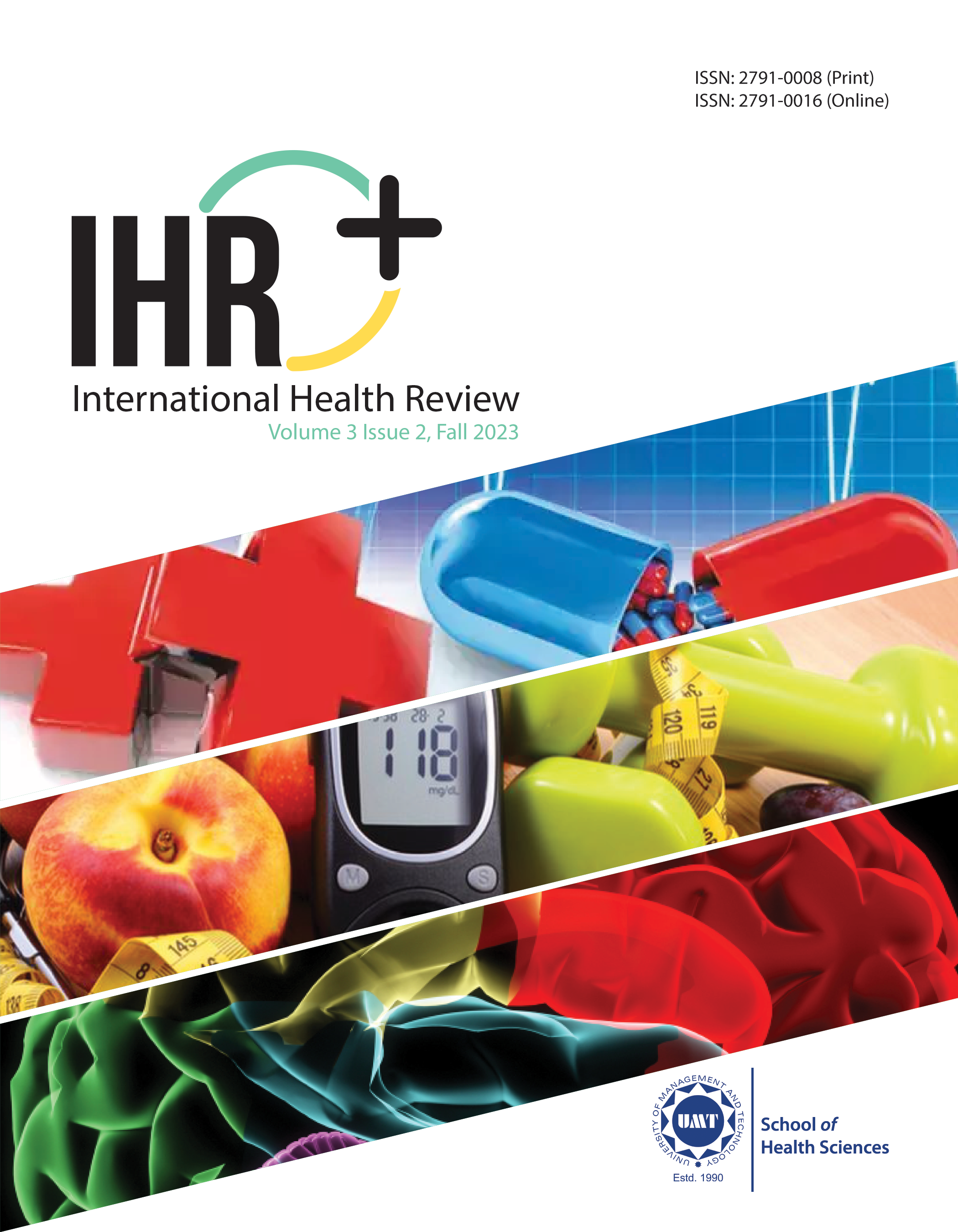Assessment of the Nutritional Status of Adolescents in Orphanage from Lahore, Pakistan
Abstract
 Abstract Views: 0
Abstract Views: 0
Orphans are one of the most vulnerable groups to nutritional deficiency, which require more nutritional care for proper growth and development. Assessment of nutritional status has cornerstone importance in orphans because growth retardation is mainly caused by undernutrition. As United Nations indicated in a recent report, there are more than 4.3 million orphan children in Pakistan and many of them are under age nearly of 17. The study aims to assess adolescent’s nutritional status and the relationship between BMI and their dietary habits. The current study is a cross-sectional study conducted on 80 orphan children aged (10-19 years). The sample of orphan children was taken from three orphanages in Lahore via non-probability convenient sampling. The data was collected using a questionnaire that included questions related to anthropometric measurements, clinical assessment, and food frequency tables. Data were analyzed by using SPSS software version 25. The frequency of orphans with normal BMI was 51.2% among the study sample. Indicatively, majority of children were suffering from paleness and dryness of skin, white spots in nails, redness in eyes, dry and brittle hair, and discolored or spongy gums. Dietary history showed that consumption of bread and cereals, starchy vegetables, junk food, and carbonated beverages was more common among orphanages. Orphan children in diverse orphanages had sub-clinical nutritional deficiencies due to poor dietary habits; emphasizing the need for detailed assessment of nutritional status in orphanages for the applications of related interventions to prevent nutritional deficiencies.
Downloads
References
Oninla SO, Owa JA, Onayade AA, Taiwo O. Comparative study of nutritional status of urban and rural Nigerian school children. J Trop Pediatr. 2007;53(1):39–43. https://doi.org/10.1093/tropej/fml051
Higashiyama Y, Kubota M, Oshima S, Mibu M, Yasui Y, Nagai A. Assessment of Japanese healthy children’s nutritional status using waterlow classification. Health. 2012;4(11):e24444. https://doi.org/10. 4236/health.2012.411158
Routray S, Meher BK, Tripathy R, Parida SN, Mahilary N, Pradhan DD. Growth and development among children living in orphanages of Odisha, an eastern Indian state. Reason. 2015;110:75–83.
De Onis M, Monteiro C, Akré J, Glugston G. The worldwide magnitude of protein-energy malnutrition: an overview from the WHO global database on child growth. Bull World Health Org. 1993;71(6):703–712.
Sarker M, Neckermann C, Müller O. Assessing the health status of young AIDS and other orphans in Kampala, Uganda. Tropical Med Int Health. 2005;10(3):210–215. https://doi.org/10.1111/j.1365-3156.2004.01377.x
Linnemayr S, Alderman H, Ka A, Biology H. Determinants of malnutrition in Senegal: individual, household, community variables, and their interaction. Econom Human Biol. 2008;6(2):252–263. https://doi.org/10.1016/j.ehb.2008.04.003
Cheah WL, Muda WA, Zamh ZH. A structural equation model of the determinants of malnutrition among children in rural Kelantan, Malaysia. Rural Remote Health. Jan-Mar 2010;10:e1248.
Sadowska J, Radziszewska M, Krzymuska A. Evaluation of nutrition manner and nutritional status of pre-school children. Acta Sci Pol Technol Aliment. 2010;9(1):105–115.
Bukht H, Qazi HJ, Islam Z, et al. Assessment of nutritional status and dietary patterns of orphans residing in different orphanages of Lahore, Pakistan. Int J Biosci. 2020;16(4):19–33.
Haleemath SKS, Bhat B, Anees S, Bangera S. Assessment of nutritional status in children of an orphanage. Indian J Clinic Anatomy Physiol. 2017;4(2):156–159.
Sunitha S, Gururaj G. Health behaviours & problems among young people in India: cause for concern & call for action. Ind J Med Res. 2014;140(2):185–208.
World Health Organization. Adoloscent health. https://www.who.int/ health-topics/adolescent-health#tab=tab_1. Accessed December 31, 2023.
Moazzam M, Zahid M, Sohail Z, Khan N, Firdous AJ. Relationship between dietary patterns and central obesity in middle aged adults: Dietary patterns and central obesity in adults. Healer. 2023;3(3):423–434. https://doi.org/10.55735/hjprs.v3i3.135
Arshad D, Sohail Z, Khan N. Association of normal weight obesity with dietary habits among young adults in Pakistan. Pak J Public Health. 2022;12(3):137–142. https://doi.org/10.32413/pjph.v12i3.1064
Weir CB, Jan A. BMI classification percentile and cut off points. In: StatePearls. StatePearl Publishing; 2019.
Riaz M, Azam N, Mahmood H, Asif R, Khan N, Mughal FA. Nutritional status assessment of orphanage children in rawalpindi. Pak Armed Forces Med J. 2021;71(6):2139–2143. https://doi.org/10.51253/ pafmj.v71i6.6496
World Health Organization. Levels and trends in child malnutrition: UNICEF/WHO/The World Bank Group joint child malnutrition estimates: key findings of the 2021 edition. https://www.who.int/ publications/i/item/9789240025257. Publsihed May 5, 2021.
Hussain M, Hossain AM, Bhuyan AH. Nutritional status of resident female orphans of selected orphanages of Dhaka city. J Bangladesh Soc Physiol. 2010;5(2):66–70. http://dx.doi.org/10.3329/jbsp.v5i2.6779
Sadik A. Orphanage children in Ghana: are their dietary needs met? Pak J Nutr. 2010;9(9):844–852. https://doi.org/10.3923/pjn.2010.844.852
El-Kassas G, Ziade F. The dual burden of malnutrition and associated dietary and lifestyle habits among lebanese school age children living in orphanages in north Lebanon. J Nutr Metabol. 2017;2017:e4863431. https://doi.org/10.1155/2017/4863431
Singwa AA, Tanya A, Ngangmou TN, Navti LK, Tamfuh PA, Ejoh RA. Nutritional status and eating habits of children in orphanages in Bamenda (North West Cameroon). Int J Nutr Food Sci. 2022;11(2):30–37. https://doi.org/10.11648/j.ijnfs.20221102.13
Copyright (c) 2023 Hamala Khan, Zoha Sohail, Noohela Khan, Shazia Zahra, Rameen Khan Niazii, Usama Anwaar, Ayesha Zaheer, Mnahil Moazzam, Dua Arshad

This work is licensed under a Creative Commons Attribution 4.0 International License.






